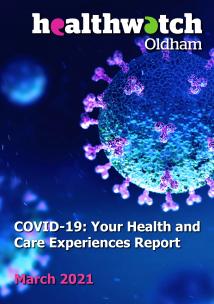COVID-19: Your Health and Care Experiences Report March 2021

This report explains the findings of the research undertaken looking at people’s experiences of health and social care services in Oldham during the COVID-19 pandemic. We have captured the experiences of local people in order that their experiences can help shape our health and care services, learn and move forward post the pandemic.
Greater Manchester has been disproportionately impacted by COVID-19 in comparison to the rest of the UK: Oldham is one of GM’s local authorities that have been in the top 20 local authorities across the UK by all-time case rate. Oldham has sustained enduring levels of COVID-19 since the beginning of the pandemic, with high numbers of people infected with COVID-19 and sadly over 690 reported deaths to date.
There is now a substantive body of evidence proving that more deprived areas have experienced higher mortality rates from COVID-19. COVID-19 has had a more severe impact on people with existing health conditions and factors such as older age, ethnicity, disabilities and income levels have increased the prevalence and severity for some people. The demographic make-up of Oldham’s population, comparatively high levels of poverty and deprivation have meant that some Oldham residents have been at increased risk throughout the pandemic.
Analysis of the feedback has identified a series of key themes which people spoke about in relation to COVID-19. These themes are:
- Communication
- Access to services
- Cancelled appointments
- Experience within services
To understand more about these key themes, findings and the recommendations we have made, you can access the full report below.
Downloads
The Oldham Care Organisation has provided us with a formal response to the report which you can see below:
Thank you for the opportunity to provide a response to the Healthwatch Oldham Report related to the experiences of health and social care services in Oldham during the COVID19 pandemic. Oldham residents have endured significantly high rates of COVID19 throughout the pandemic; we would like to take this opportunity to pay respects to those residents who have died and those who continue to live with the impact of COVID19.
COVID19 has placed significant challenges on the services provided by the Oldham Care Organisation both within the hospital and the community setting. We have at all times based our service response to the pandemic on national guidance available to us, and local COVID19 rates. The findings of this report will offer us insight into the experiences of health and social care services in Oldham and will give us an opportunity to continue to learn and improve.
The key findings of the report highlight limited access around speaking to a family member admitted to hospital as an area for improvement. We recognise the importance that contact with loved ones has upon recovery from illness. Our clinical teams have developed and continue to improve processes to support communication with families, through regular telephone calls to update on patient progress and the use of Skype and Facetime so that relatives can see their loved ones. We do appreciate that we have further work to do, and we are committed to improving the experience of our patients and their loved ones during these challenging times and in the future.
The report also recognises that attending appointments and treatments alone can be difficult especially in the case of maternity services and receiving news on life-changing conditions. We will continue to review national guidance and reflect this within our Hospital Visitors Policy. We are pleased to be able to confirm that from the 7th April 2021 midwife and scan appointments on the hospital premises can be attended by a loved one.
The report notes the harsh light on some of the health and wider inequalities that persist in our society. It has become increasingly clear that COVID-19 has had a disproportionate impact on many who already face disadvantage and discrimination. The impact of the virus has been particularly detrimental on people living in areas of high deprivation, on people from Black, Asian and minority ethnic communities (BAME), and on older people, men, those with a learning disability and others with protected characteristics. Oldham Care Organisation recognise that our staff need to be culturally as well as linguistically competent. We recognise the importance of responsiveness to the health beliefs, practices, and cultural needs of our patients as a clear requirement to ensure we provide equitable access to healthcare services from diverse populations.
As we begin to recover from COVID19 the services we deliver will take a risk-based approach, focusing upon ensuring that we keep our patients as safe as possible whilst under our care. We would like to provide assurance that this report will be received by the Oldham Care Organisation Patient Experience Group so that actions can be clearly identified and agreed upon.

